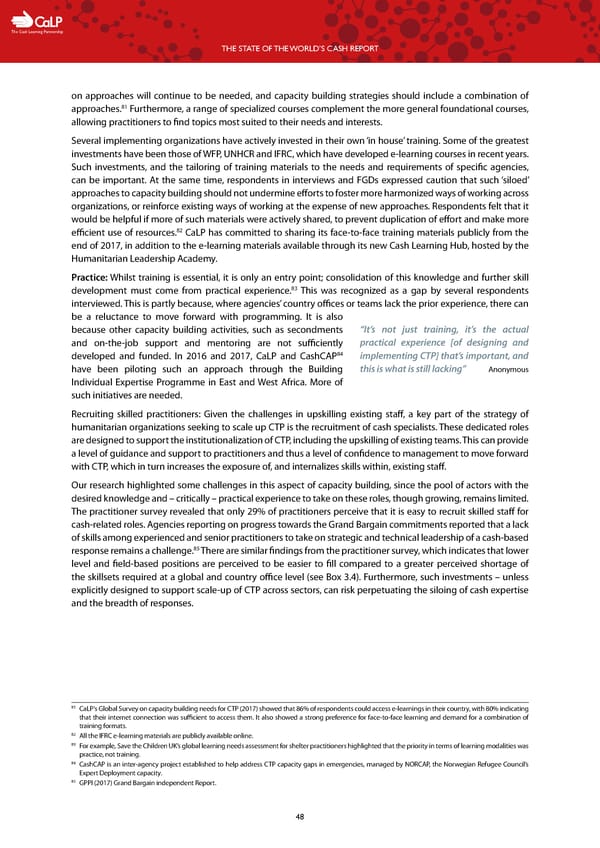C The Cash Learning Partnership THE STATE OF THE WORLD’S CASH REPORT on approaches will continue to be needed, and capacity building strategies should include a combination of 81 approaches. Furthermore, a range of specialized courses complement the more general foundational courses, allowing practitioners to find topics most suited to their needs and interests. Several implementing organizations have actively invested in their own ‘in house’ training. Some of the greatest investments have been those of WFP, UNHCR and IFRC, which have developed e-learning courses in recent years. Such investments, and the tailoring of training materials to the needs and requirements of specific agencies, can be important. At the same time, respondents in interviews and FGDs expressed caution that such ‘siloed’ approaches to capacity building should not undermine efforts to foster more harmonized ways of working across organizations, or reinforce existing ways of working at the expense of new approaches. Respondents felt that it would be helpful if more of such materials were actively shared, to prevent duplication of effort and make more 82 efficient use of resources. CaLP has committed to sharing its face-to-face training materials publicly from the end of 2017, in addition to the e-learning materials available through its new Cash Learning Hub, hosted by the Humanitarian Leadership Academy. Practice: Whilst training is essential, it is only an entry point; consolidation of this knowledge and further skill 83 development must come from practical experience. This was recognized as a gap by several respondents interviewed. This is partly because, where agencies’ country offices or teams lack the prior experience, there can be a reluctance to move forward with programming. It is also because other capacity building activities, such as secondments “It’s not just training, it’s the actual and on-the-job support and mentoring are not sufficiently practical experience [of designing and 84 implementing CTP] that’s important, and developed and funded. In 2016 and 2017, CaLP and CashCAP have been piloting such an approach through the Building this is what is still lacking” Anonymous Individual Expertise Programme in East and West Africa. More of such initiatives are needed. Recruiting skilled practitioners: Given the challenges in upskilling existing staff, a key part of the strategy of humanitarian organizations seeking to scale up CTP is the recruitment of cash specialists. These dedicated roles are designed to support the institutionalization of CTP, including the upskilling of existing teams. This can provide a level of guidance and support to practitioners and thus a level of confidence to management to move forward with CTP, which in turn increases the exposure of, and internalizes skills within, existing staff. Our research highlighted some challenges in this aspect of capacity building, since the pool of actors with the desired knowledge and – critically – practical experience to take on these roles, though growing, remains limited. The practitioner survey revealed that only 29% of practitioners perceive that it is easy to recruit skilled staff for cash-related roles. Agencies reporting on progress towards the Grand Bargain commitments reported that a lack of skills among experienced and senior practitioners to take on strategic and technical leadership of a cash-based 85 response remains a challenge. There are similar findings from the practitioner survey, which indicates that lower level and field-based positions are perceived to be easier to fill compared to a greater perceived shortage of the skillsets required at a global and country office level (see Box 3.4). Furthermore, such investments – unless explicitly designed to support scale-up of CTP across sectors, can risk perpetuating the siloing of cash expertise and the breadth of responses. 81 CaLP’s Global Survey on capacity building needs for CTP (2017) showed that 86% of respondents could access e-learnings in their country, with 80% indicating that their internet connection was sufficient to access them. It also showed a strong preference for face-to-face learning and demand for a combination of training formats. 82 All the IFRC e-learning materials are publicly available online. 83 For example, Save the Children UK’s global learning needs assessment for shelter practitioners highlighted that the priority in terms of learning modalities was practice, not training. 84 CashCAP is an inter-agency project established to help address CTP capacity gaps in emergencies, managed by NORCAP, the Norwegian Refugee Council’s Expert Deployment capacity. 85 GPPI (2017) Grand Bargain independent Report. 48
 The State of the World's Cash | Full Report Page 49 Page 51
The State of the World's Cash | Full Report Page 49 Page 51